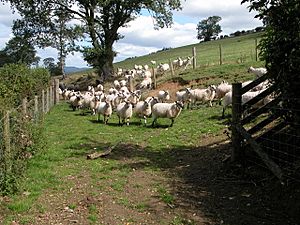Beulah Speckled Face facts for kids
The Beulah Speckled Face is a special type of domestic sheep that comes from the United Kingdom. These sheep have lived in the hills of Wales for over a hundred years. A group was officially formed in 1958 to help protect and promote the breed. You'll mostly find these sheep in places like Eppynt and Llanwrtyd Wells in Wales. They are not very well known outside of Wales.
No one is completely sure how this breed started. It might be a very old type of sheep that has adapted to its Welsh home over many centuries. The sheep get their name from their unique black and white faces. Their faces have no wool on them. Female Beulah sheep, called ewes, do not have horns. They are often bred with other types of male sheep, called rams, like the Suffolk or Texel. This helps create mixed-breed lambs known as "mules." These mules are often raised for their meat. Beulah ewes are known for being excellent mothers and producing lots of milk for their lambs.
What Makes Beulah Sheep Special?
The Beulah Speckled Face is a medium-sized sheep. It is quite large for a sheep that lives in the hills. Their faces are white with black spots, like speckles. They have a black nose area and black around their eyes and ears. Both the female ewes and the male rams do not have horns. Their legs are also black and white.
Size and Weight
- Female Beulah sheep (ewes) usually weigh about 52 kilograms (115 pounds).
- Male Beulah sheep (rams) are heavier, weighing around 86 kilograms (190 pounds).
Their Woolly Coat
The wool from a Beulah Speckled Face sheep is white. It does not have any dark fibers mixed in. Each fleece can weigh between 1.4 to 3.5 kilograms (3 to 7.7 pounds). The wool fibers are about 7.5 to 12.5 centimeters (3 to 5 inches) long. The wool is also quite fine, measuring 25 to 36 microns thick. This wool is easy to dye and does not have many natural curls. People use it for hand spinning, weaving, and knitting. It can be made into clothes and fabrics. The thicker wool is often used for things like rugs and home textiles.
 | Ernest Everett Just |
 | Mary Jackson |
 | Emmett Chappelle |
 | Marie Maynard Daly |


